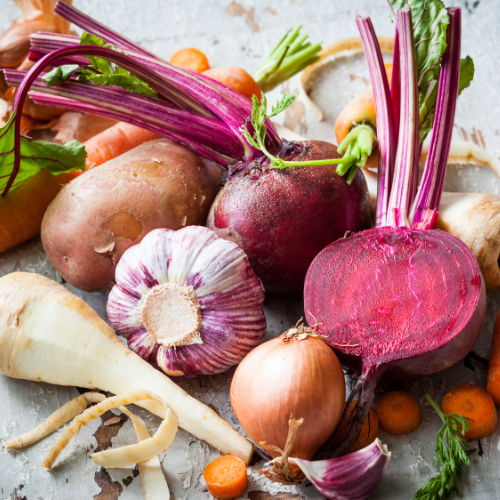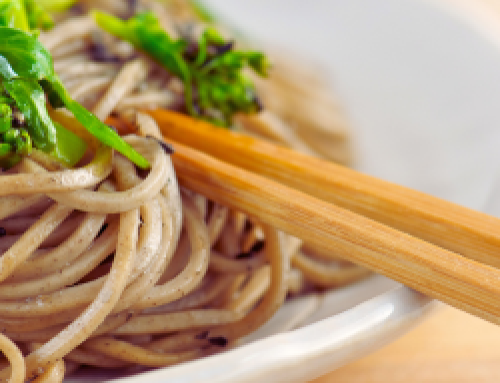 Winter Nutrition
Winter Nutrition
The tendency to hibernate and reach for comfort foods in the cooler months is understandable. As the temperature falls and the days shorten, being outside tends to lose its appeal and it seems far more natural to curl up on the couch and eat warming foods. Whilst a natural slowing down can be a good thing, as our minds and bodies take the time to rest and recuperate, the winter months can still be a time of activity, eating well and overall good health. Continuing to support our wellbeing with healthy and balanced meals will keep us feeling our best.
Below are some ideas for maintaining healthy eating patterns and habits over the winter months, seeing us in good stead to embrace the warmer weather when it arrives.
Boost complex carbohydrates
The inclusion of complex carbs such as whole grains, nuts or fruits into your morning meal will help you feel fuller for longer and maintain good energy and focus during your day. Complex carbs are also important to give the necessary fuel to bring some activity or exercise into your day, which can improve circulation and help maintain strength and fitness levels in the cooler months. Warm breakfasts, such as porridge, can feel particularly satisfying in cooler weather. Where possible, the addition of some protein into the morning meal will bring even greater benefits, and help further stabilise energy levels throughout the day. Some easy options include warm amaranth and oatmeal with chia seeds and fruit, or scrambled eggs and avocado on wholegrain toast.
Enjoy winter seasonal vegetables and fruit
Whilst it can seem like the range of fruit and vegetables drops off a bit in winter there are in fact a great range of fresh foods that come into their own at this time of year. Citrus fruits like grapefruit, mandarins and oranges are all delicious and in season over winter, whilst other options like apples and kiwi fruit are usually readily available. Try including fruit in your breakfast if you are not already, for an extra boost, or use stewed fruits in warming winter desserts.
In addition, root vegetables like carrots, parsnips and sweet potatoes give us a boost for the winter months and help keep our immune system strong. Broccoli and cauliflower are also great winter vegetables, with a range of health benefits, and can be added to a variety of meals. Especially popular at this time of year are stews, soups and casseroles, which can use a wide variety of vegetables, with the leftovers used another day. Moreover, while fresh is often best, don’t be afraid to stock the freezer up with different vegetables, which can provide convenient and easy additions to any meal.
Maintain your intake of Vitamin D
Maintaining an adequate intake of vitamin D is important for a range of functions including mood and bone health, yet during the winter months we often spend less time outdoors, meaning we may be producing less of this vitamin than during summer. Foods with good sources of vitamin D include fish like tuna and sardines, as well as egg yolks and mushrooms. These can easily be incorporated into winter meals to help maintain healthy vitamin D levels.
Keep hydrated
When the weather is cool, we often feel less thirsty and so tend to drink less. However, maintaining adequate hydration levels is important for our energy levels and overall wellbeing. This is especially relevant if we spend a lot of time in heated environments which can be drying. If a cool drink from the fridge loses its appeal during winter, try room temperature water or even one of the many varieties of herbal tea, such as peppermint or chamomile. Whilst caffeinated drinks, such as coffee and black tea, can be enjoyed in moderation, it is a good idea to ensure your hydration requirements are met with some of the other options mentioned above, where possible, to help maintain healthy fluid levels.
Focus on healthy fats
Whilst there is often a tendency to seek out denser, comfort foods during winter this doesn’t mean we need to overindulge in fatty or fried foods. Including healthy fats, which include the Omega 3 and 6 fats, in your meals can increase satiation, keeping you feeling fuller for longer, as well as bringing a range of health benefits. Some good sources of these foods include: oily fish, such as salmon or sardines (omega 3), as well as nuts and seeds (omega 6). These options contain polyunsaturated fats that are good for heart health as well as healthy cell, skin and hormone functioning.
The above provide some general ideas for helping to maintain health and energy throughout the winter months. If you have any particular health concerns or questions you are recommended to see your preferred health practitioner.
Wishing you good health throughout winter!
By Kerrie Clayton
Kerrie has been a member of the AHHCA for over 10 years and is currently part of its Committee of Management. She is a qualified Holistic Health Practitioner, Nutitionist and Reiki Master. Kerrie may be contacted via www.wellnesswithkerrie.com





Good advice for maintaining our overall health during the cold winter months .
Yes great advice helping to keep our bodies strong over winter